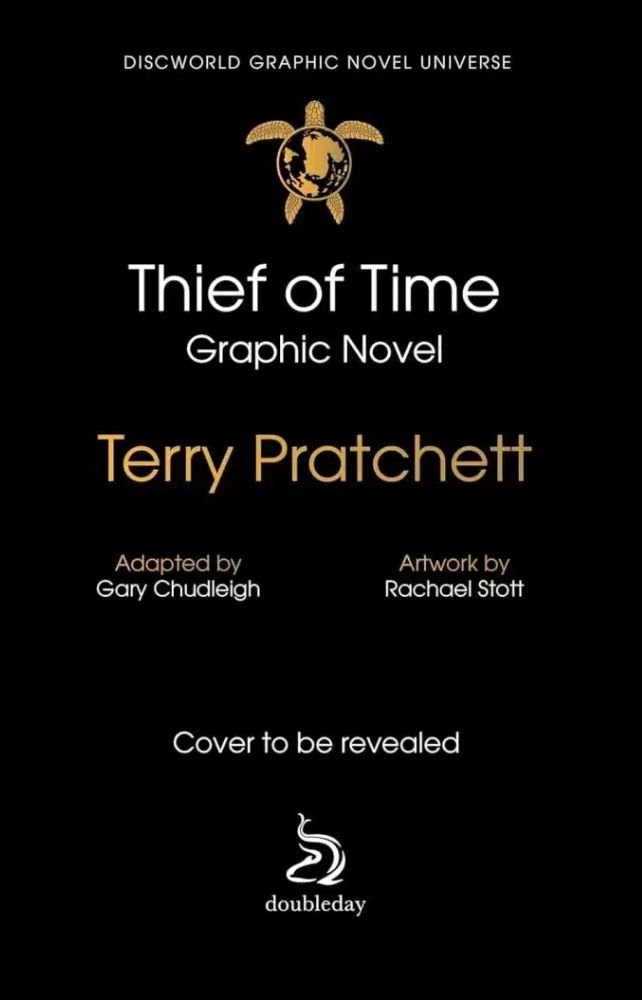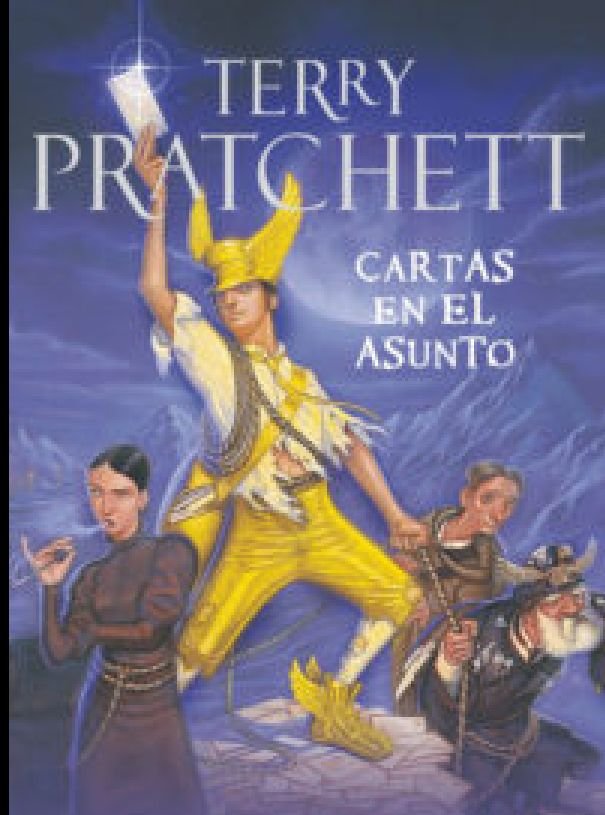Recently, Rhianna Pratchett announced the creation of three graphic novels based on Discworld, the monumental series by her father, Terry Pratchett.
Congratulations! I thought, as one of the many fans who have delighted in this wild and fantastical universe, centered around the capital city of Ankh-Morpork.

Source
That’s why I want to talk today about the character Moist von Lipwig, a cunning and hilarious rogue, whose social wit rivals only that of the city’s tyrant, Havelock Vetinari.
Lord Vetinari “rescues” Moist from the gallows—not to set him free, but to place him in a gilded cage. He appoints him Director of the city’s Post Office, a hellscape of undelivered letters piled to the ceiling in every room of the building.
Through a series of tricks and schemes, the new director manages to recruit staff, recover lost items, and deliver even the oldest letters to their rightful recipients.
This daunting task involves dealing with thieves, golems, obsessive collectors, arsonists, and winged monsters. To top it off, he faces an even greater challenge: taking on the might of Reacher Gilt, director of the Grand Trunk, a communication network resembling heliographs or light signals—an economic empire dominating messaging across nations.

Cover of Going Postal
This summary of the characters’ transformations can’t possibly do justice to Going Postal—or any of Terry Pratchett’s novels. The borderline-psychiatric, caricature-like characters sparkle with eccentric habits and dialogue that teeters on the absurd, all to the reader’s delight.
These hyperbolic yet realistic portrayals work because, let’s face it, haven’t we all met people who behave in such bizarre ways?
In this society, crime is organized by the government itself through guilds that pay taxes (the Assassins’ Guild, Thieves’ Guild, Alchemists’ Guild, Beggars’ Guild, etc.). Lord Vetinari works with steady determination to salvage dysfunctional state institutions like the Post Office or the Royal Bank. In other novels, he balances relations with the eccentric wizards of Unseen University and strives to make the city’s Night Watch as effective as possible. Amid this world of contradictions, magic occasionally intervenes, and anachronisms abound.
But what truly captivates readers is the brilliant omniscient narrator, who comments—through asides or lengthy paragraphs—on the characters’ actions. This device is hilariously genius, leaving me in tears of laughter.
This might also explain why adapting Pratchett’s novels to film is so challenging: the narrator would require constant voice-over, which clashes with cinematic language.
I’ve particularly loved how Pratchett transforms terror and tension into comedy through the characters’ contrasting behaviors. His work refines Western dark humor, blending it with British wit’s subtle suggestions and double entendres. It’s no wonder he was knighted for his extraordinary contributions to English literature.

Great A’Tuin and the four elephants holding up the Disc
Like J.K. Rowling’s Harry Potter, Discworld has transcended the UK. To me, Going Postal—like many Discworld novels—has it all: fast-paced action driven by witty, suspenseful dialogue; adventurous plots with intrigue; a meddlesome omniscient narrator adding to the cheeky tone; sharp dramatic irony; and countless nods to real-world history.
Pratchett’s simplicity allows multiple layers of interpretation. His works appeal to casual readers and literary enthusiasts alike.
To me, he’s one of the great literary geniuses of the 20th and 21st centuries—though he’d likely retort with irony, “You must be the genius!”
So I highly recommend Going Postal to anyone seeking a delightful read. Fans of the genre will eagerly await the graphic novel adaptations of this thrilling fantasy world.
Thanks for reading my post!
EN ESPAÑOL
¡Nos han llegado buenas cartas!
Hace poco Rhianna Pratchett anunció la realización de tres novelas gráficas basadas en el Mundodisco, el monumental conjunto de obras de su padre Terry Pratchett.
¡Enhorabuena!, pensé, como uno de los tantos aficionados que nos hemos divertido a mares con ese universo loco y fantástico, que gira en torno a la capital Anhk Morpork.

Fuente
Por eso quiero comentar hoy acerca del personaje Húmedo von Mustachen, un pícaro muy astuto y divertidísimo, solo comparable en sagacidad social con el tirano de la ciudad, Havelock Vetinari.
Lord Vetinari "rescata" de la horca a Húmedo, pero no para dejarlo en libertad, sino para meterlo dentro de una jaula de oro. Lo nombra Director de la Oficina de Correos de la ciudad, nada menos que un infierno de montañas de cartas sin entregar que llenan hasta el techo todas las habitaciones del edificio.
Mediante múltiples artimañas y picardías, el nuevo director logra reclutar personal, recuperar objetos perdidos y entregar a sus destinatarios incluso aquellas cartas más añejas.
Esta difícil labor implica lidiar con ladrones, golems, coleccionistas obsesivos, incendiarios y monstruos alados. A lo cual se añade otra tarea más difícil: enfrentarse al poderío de D'Oropel, director del Gran Tronco, un complejo de comunicaciones basado en lo que parecen ser heliógrafos o señales de luces, un imperio económico que domina la mensajería entre diversos países.

Portada de Cartas en el asunto
Este resumen de transformaciones de los personajes dentro de la trama nunca hará justicia ni a esta ni a ninguna de las novelas de Terry Pratchett. Los personajes casi caricaturescos y de conductas rayanas en lo psiquiátrico, tienen costumbres y diálogos chispeantes que bordean lo increíble, para divertimento del lector.
Tales caracterizaciones tienen la virtud de combinar lo hiperbólico y lo realista porque ¿acaso no conocemos a personas que de verdad se comportan de esas maneras tan extrañas?
En medio de tal sociedad, el crimen ha sido organizado por el propio jefe del gobierno mediante gremios que deben pagar impuestos al fisco (el gremio de los asesinos, los ladrones, los alquimistas, los mendigos, etcétera), Lord Vetinari trata con pausado pero constante esfuerzo de rescatar las disfuncionales instituciones del Estado como la Oficina de Correos o la Banca. También, en otras novelas, procura mantener cierto equilibrio con los grandes magos de la Universidad Invisible, todos ellos un poco chiflados; e intenta que la Guardia policial de la ciudad sea todo lo efectiva posible.
En medio de este universo de incongruencias, la magia interviene a veces y los anacronismos casi siempre.
Pero lo verdaderamente seductor para el lector son las brillantes intervenciones del narrador omnisciente que comenta mediante acotaciones y a veces largos párrafos, muchas de las actuaciones de sus personajes. Esto resulta de una genialidad hilarante que ha logrado humedecerme los ojos después de largas carcajadas.
Quizás por eso sea tan complejo llevar las novelas de Terry Pratchett al cine, pues su narrador tendría que ser una constante voz en off, menos afín al lenguaje cinematográfico.
He disfrutado mucho el hecho artístico de advertir cómo convierte el terror y el miedo de una escena en una situación cómica debido al contraste entre las conductas de los personajes. Quizás con este autor se refina el humor negro de la tradición occidental al combinarse con el humor inglés siempre pleno de sugestiones y doble sentido. Por ello le nombran caballero de la corona (Sir) debido a su extraordinaria contribución a las letras inglesas.

Gran Atuin y los cuatro elefantes sobre los que se sostiene el Disco
El universo de Mundodisco ha trascendido el ámbito del Reino Unido como lo hizo luego su coterránea J. K. Rowling y su Harry Potter.
A mi juicio Cartas en el asunto, como muchas de las novelas de este universo, lo tiene todo: mucha acción dentro de un ritmo ágil basado en diálogos graciosos y llenos de suspenso; una trama de aventura con sus intrigas y complicaciones; un narrador omnisciente que mete la cuchareta de vez en vez para contribuir al tono zumbón y simpático general; una ironía dramática muy fina y múltiples alusiones a la historia universal.
Además, la sencillez con que escribe Pratchett permite varios niveles de lectura. Sus textos pueden ser entendidos tanto por un lector común como por lectores exigentes en sus capas más profundas.
Para mí es uno de los grandes genios literarios del siglo 20 y 21, y tal vez si escuchara o leyera esta frase me respondiera con ironía: "más genio será usted".
Así que recomiendo Cartas en el asunto a quienes quieran pasar un rato muy agradable. Los amantes de este género esperaremos las versiones gráficas de este apasionante mundo fantástico.
Gracias por leer mi post.


